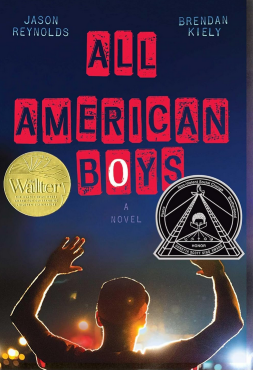Reading All American Boys with my white kids.

When a good friend suggested we take our kids to hear Jason Reynolds and Brendan Kiely talk about their bestselling YA novel, All American Boys, in 2018, I took a minute to consider. At the time, my 14-year-old read voraciously, but my 10-year-old preferred screens to books. Attending the Loudoun County Public Library event with my kids turned out to be one of the best parenting decisions I’ve made.
During their “1book 1community” program in Tuscarora High School’s auditorium, Reynolds (who is Black) and Kiely (who is white) talked about their motivation for writing All American Boys: George Zimmerman’s December 2013 acquittal, under Florida’s “stand your ground” law, over the February 26, 2012, shooting and killing of 17-year-old African American Trayvon Martin.
The authors heard the news of Zimmerman’s exoneration while on a tour together for books they’d separately written. They shared their frustrations over the verdict, and later, when a white police officer shot and killed Michael Brown, a Black 18-year-old, in Ferguson, Missouri, on August 9, 2014, they began plotting a joint novel to address the growing racial tension amid a string of high-profile police killings of Black boys and men.
Although I’d read books about the epidemic of police brutality and its roots in American history, I hadn’t found anything age-appropriate for my kids. All American Boys (recommended for ages 7-16) opens with Quinn Collins, a white high-school basketball star, witnessing Paul Galluzzo, a white cop and close family friend, accuse 16-year-old Rashad Butler (one of Quinn’s classmates) of shoplifting a bag of chips from a corner bodega. When Rashad attempts to defend himself, Paul beats the Black teen.
The genius of All American Boys resides not only in its complex and timely story, but also in its dual narrative in which Kiely wrote Quinn’s chapters and Reynolds wrote Rashad’s. While Rashad stays home from school to recover from the attack, Quinn feels torn over forgetting what he saw (in order to stay loyal to Paul) and the subsequent impossibility of doing so once video footage of the beating emerges. In the aftermath of being shown the violent encounter, the community grapples with how to assign blame and seek justice.
The novel’s title reminds me of Langston Hughes’ poem “I, Too, Sing America.” A staple of high-school English classes, it succinctly captures a segregated nation wherein “They send me to eat in the kitchen/When company comes.” The poem’s speaker contemplates a future where 1) he demands to stay at the table, 2) his dark skin is recognized as beautiful, and 3) those who sent him away are ashamed. The poem’s final line reads: “I, too, am America.”
All American Boys holds a mirror up to the U.S. in the 2020s the same way Hughes’ beloved poem did in the 1920s. As a former AP English Language and Composition teacher, I’d advocated including it in the curriculum. Kiely and Reynolds have gifted us a work of fiction to use as a springboard into tough conversations about race and the role of policing in America. Young people deserve compelling and complex literature that helps them develop critical-thinking skills during classroom discussions.
But until I attended that Virginia library event, I didn’t fully appreciate the book’s impact. All American Boys received multiple accolades from critics and librarians, including being named an Author Honor Title by the Coretta Scott King Book Awards. Along with the praise, unfortunately, it has also garnered a top place on lists of most frequently banned works. Much of the backlash revolves around its depiction of police brutality, which I find interesting since the authors made a conscious decision not to include a homicide in their plot in order to provide a clear chance for redemption.
During their appearance that night, Reynolds qualified his remarks about Kiely by pointing out that he wasn’t going to praise a white guy for doing the decent thing by speaking out — or, in this case, writing — against police killings of Black boys. Words aren’t enough. In doing so, he gave white parents like me a blueprint for how to communicate that truth to our own kids.
Wendy Besel Hahn is the nonfiction editor for Furious Gravity, an anthology of 50 women writers in the Washington, DC, area. Her work appears in the Washington Post, HuffPost, Hippocampus, Sojourners, and elsewhere. She lives and writes in Denver, Colorado.

